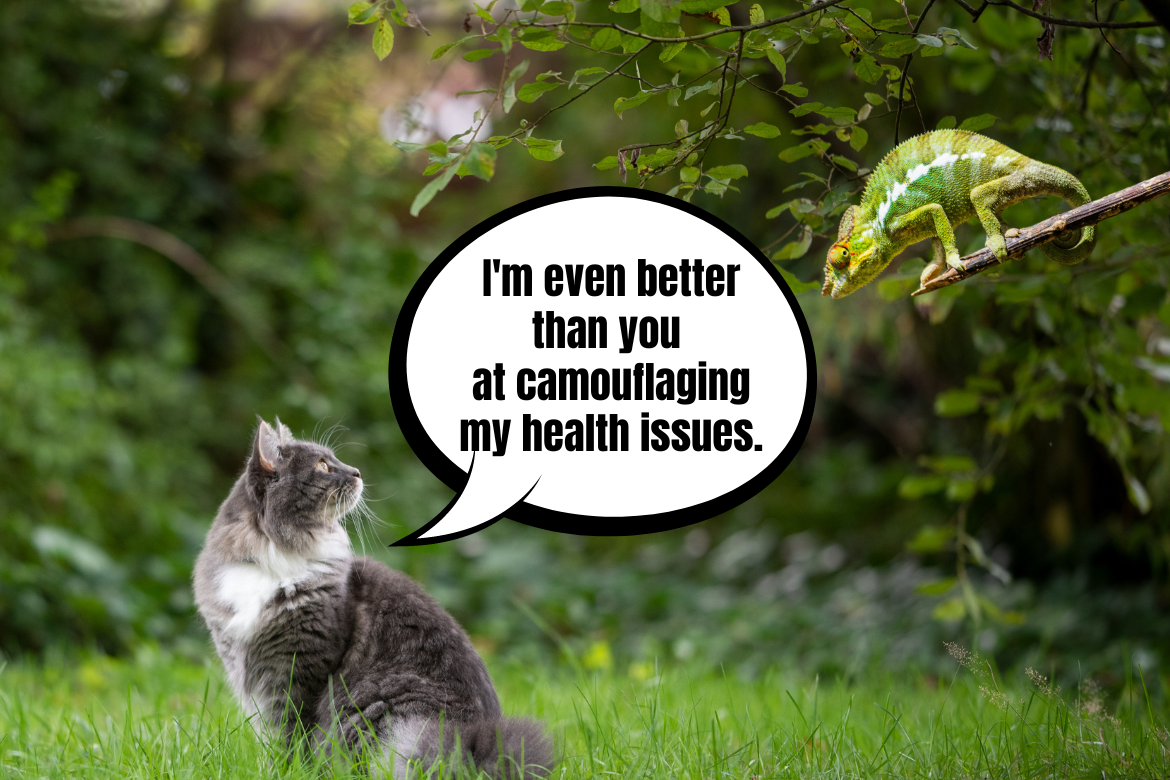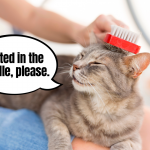In early July, we talked on our blog about 5 typical cat ailments that don’t always require you to rush to the veterinary clinic. Today, we’re taking on the same topic, but from a completely different perspective, and we’re examining which emergencies and worrying symptoms might require immediate assistance from a feline specialist. Do you know when to grab your cat and dash to the veterinary clinic?
Cats – masters of camouflage
It is said that chameleons are among the animal kingdom’s masters of camouflage, but in the world of furry creatures, cats decidedly take the lead in this matter. Aside from their amazing ability to sneak around, squeeze into tight spaces, and snatch chicken off the kitchen counter like a born ninja, cats have perfected the art of concealing their physical and mental state. Unfortunately, from the perspective of a cat Carer, such camouflaging of discomfort does not make life with a cat any easier. When a health problem arises, and the cat feels unwell, changes in their behavior are often so subtle that they are difficult to detect. And this can lead to complications that none of us would like to face. Treating illnesses in their early stages is usually easier and less expensive. So, in which situations is it better not to delay the trip to the vet?
Rush your cat to the doctor
When the cat has breathing problems. Panting, breathing difficulties, audible struggles to take in air – in such situations, there’s no time to wait. Your cat may be experiencing an asthma attack, an intense allergic reaction, heatstroke, or breathing problems related to another disease or accident. These are not symptoms that will go away on their own, and even if the gasping stops momentarily, it’s still essential to immediately have a specialist examine the cat.
When the cat has serious injuries. Allowing your cat to roam outside freely every day puts their health at risk. Being hit by a car, encountering other predators, falling from heights, getting stuck in narrow crevices – such incidents often lead these cats to become regular visitors to veterinary clinics, and unfortunately, they don’t always come out unscathed. But not only outdoor cats are at risk of serious bodily injuries. If your cat falls off a shelf, lands awkwardly on a paw while jumping off a scratching post, gets wedged in balcony railings, or you suspect internal injuries, seek veterinary care as soon as possible.
When the cat is poisoned. More often than not, cats chew on plants that are highly toxic to them and should not be found in our homes. Remember that even if you place a potted plant on a high shelf or stand, there are no places that a curious cat can’t reach. At home, your cat can also poison themselves by eating medications, cleaning agents, or food (alcohol, grapes, chocolate). If you notice that the cat is vomiting, experiencing diarrhea, having seizures, or appears lethargic, consult a veterinarian immediately – quick action can save the cat from very serious consequences and even loss of life.
You can read more about plants safe for cats on our blog: https://blog.mykotty.pl/en/2020/06/29/cats-herbarium-herbs-safe-for-furries/
When the cat has litter box issues. Kidneys and the urinary system are often the source of health problems in cats, and signs of pain when urinating are already a clear sign that it’s worth having the cat’s kidneys and urinary tract checked. Blockages in these areas can be life-threatening and have long-term effects on the cat’s health. If they are not immediately resolved, they often lead to the need for ongoing treatment throughout the cat’s life.
When the cat becomes suddenly apathetic. Cats are known for their lazy nature, and we know perfectly well that some furballs can sleep a considerable part of the day, getting up only briefly for playtime, meals, and a visit to the litter box. But as cat Carers, we must learn to distinguish between habitual feline laziness and apathy because if the cat suddenly loses interest in their surroundings, wobbles, shows no interest in food, or avoids people, these may be the first signs of more severe health problems.
When the cat loses appetite. Reluctance to food happens to everyone. It’s enough for the outdoor temperatures to be too high, and not even the most aromatic portion of fresh meat will lure the cat out of their cold hideout. But if your cat suddenly stops eating or drinking and refuses meals for a full 24 hours, it’s a fast track to serious problems and a sign that you need to book a veterinary appointment as soon as possible.
When diarrhea doesn’t end. In a previous article on our blog, we mentioned that diarrhea is one of those ailments that can initially be observed at home without rushing to the veterinary clinic. However, if diarrhea or vomiting persists for more than 1 day, frequently recurs, or if you notice worrisome changes (e.g., blood), a visit to the specialist and implementing treatment will be necessary.
Check which typical cat ailments you can observe at home before going to the specialist: https://blog.mykotty.pl/en/2023/07/10/fur-in-trouble-find-out-how-to-deal-with-common-cat-ailments-before-you-visit-the-vet/
When the cat loses weight. With a properly balanced diet and daily exercise, your cat should easily maintain their body weight – not getting fat, but also not losing weight. However, if the cat has a good appetite, and their weight still decreases, the culprit may be intestinal parasites, an overactive thyroid, diabetes, or even a tumor. The sooner you diagnose the cause of the problem, the greater the chance that the cat will return to full health.
The vet is not that scary…
A trip to the veterinary clinic often involves enormous stress for the cat and therefore the cat Carer as well. For this reason, you may sometimes wonder if the symptom or behavior of your cat that concerns you is indeed a reason to visit the specialist. It often is. Our list certainly does not cover all cases where an urgent visit to the veterinary doctor may be indicated. We have always followed the rule of playing it safe and if our intuition tells us that one of our myKotty team cats may not feel 100% well, a quick visit to the clinic allows us to dispel all doubts and, if necessary, start treatment immediately. 😊
And how do you feel about vet visits, fabCats? Do you go for a check-up with every minor issue, or have you already learned to read your cats so well that you know exactly when something is wrong with them? We invite you to a discussion.




